US Says Iran Removing IAEA Cameras 'Extremely Regrettable'
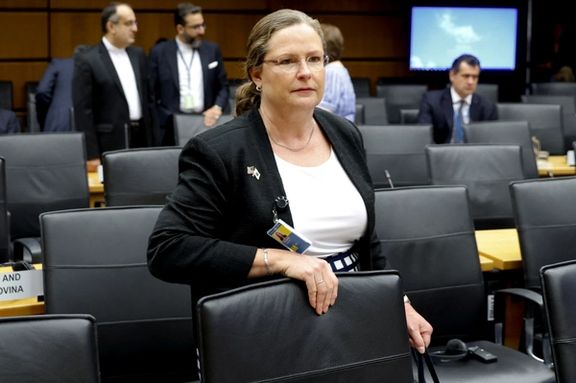
It would be regrettable and counterproductive for Iran to remove two of the UN nuclear watchdog's surveillance cameras as it has announced, the United States said on Wednesday.

It would be regrettable and counterproductive for Iran to remove two of the UN nuclear watchdog's surveillance cameras as it has announced, the United States said on Wednesday.
The US and its European allies, the United Kingdom, France and Germany are pushing for a resolution criticizing Iran’s lack of cooperation with the International Atomic Energy Agency (IAEA) at the watchdog's board.
"If accurate, reports that Iran plans to reduce transparency in response to this resolution are extremely regrettable and counterproductive to the diplomatic outcome we seek," a US statement to a meeting of the 35-nation Board of Governors said ahead of a vote on the U.S.-backed draft resolution. "We do not seek escalation (with Iran)," the statement added.
Earlier in the day the Atomic Energy Organization of Iran announced that it has decided to disconnect two IAEA monitoring devices, measuring uranium enrichment, without naming the location.
The equipment in question, Iran said, are not related to IAEA monitoring according to the Non-Proliferation Treaty, but are part of its “voluntary cooperation” under the Additional Protocol.
The resolution is tabled by the West after IAEA director Rafael Grossi issued a report to the board on Monday criticizing Iran for lack of cooperation in an investigation of its past secret nuclear activities.
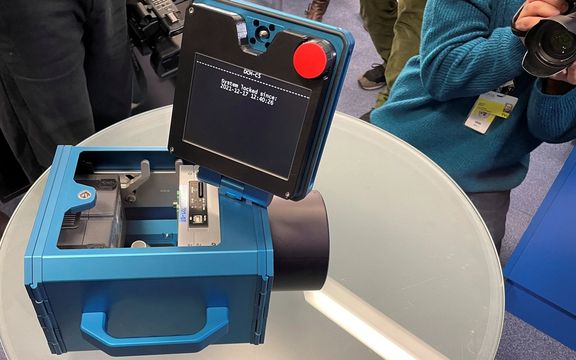
With a resolution critical of Iran pending at the UN nuclear monitoring board, Tehran has announced new restrictions on access by international inspectors.
The Atomic Energy Organization of Iran (AEOI) said Wednesday it would cut off several cameras and other monitoring equipment, leaving only that required under the Nuclear Non-Proliferation Treaty and removing ones installed as part of the Additional Protocol.
A statement from the AEOI argued that Iran’s acceptance of monitoring based on the Additional Protocol was ‘voluntary’ and designed to show goodwill towards the United Nations’ International Atomic Energy Agency (IAEA).
The IAEA board of governors, meeting this week in Vienna, is due to consider a resolution from the ‘E3’ (France, Germany, the United Kingdom) and the United States criticizing what agency director general Rafael Mariano Grossi told the board Monday was Iran’s failure to answer questions over unexplained uranium traces found by IAEA inspectors in Iran.
The AEOI statement implicitly linked its statement to developments at the IAEA.
“The Islamic Republic until now has maintained extensive cooperation with the International Atomic Energy Agency, but the agency unfortunately without considering that this cooperation was due to Iran’s goodwill, not only has not been appreciative, but even has interpreted it as Iran’s duty,” the AEOI said. “For this reason it was decided to disconnect Additional Protocol OLEM [on-line enrichment monitors] and ‘flow meter’ instruments, issuing the order to officials.”
Tensions in Vienna
Iran’s announcement said that monitoring cameras required under the NPT – constituting 80 percent of IAEA equipment in Iran – would continue to operate, but the timing of its move will raise tensions in Vienna, where China and Russia have criticized the US-E3 resolution for undermining efforts to revive the 2015 Iran nuclear deal, the JCPOA (Joint Comprehensive Plan of Action).
Iran in 2019, the year after President Donald Trump withdrew the US from the JCPOA, began to exceed the deal’s limits on its nuclear program, and has now accumulated enough, or nearly enough, highly-enriched uranium for a weapon, an aim Iran denies.
Tehran has also since 2021 reduced the access of IAEA inspectors, leading Grossi to argue the agency’s ability to monitor the nuclear program is seriously restricted. Grossi reached a temporary arrangement in February 2021, later extended, that Iran would keep data from certain cameras, including in plants manufacturing centrifuges used to enrich uranium, but this came under increasing strain as negotiators from the E3, China, Russia, Iran and the US struggled in Vienna to reach agreement over reviving the JCPOA.
An E3 statement issued Tuesday warned that with already restricted IAEA access“neither the Agency, nor the international community, know how many centrifuges Iran has in its inventory, how many were built, and where they may be located, precisely at the point it is expanding its programme [sic] and its component manufacturing and centrifuge assembling capabilities.”
The Europeans stressed that the IAEA had judged its verification work had been “seriously affected” and that even if the JCPOA were revived, the agency might not “be able to restore the continuity of knowledge…given the time that has now elapsed…”

A statement from the ‘E3’ Tuesday noted Iran’s nuclear program as more advanced than ever and expressed commitment to continued diplomacy.
France, Germany, and the United Kingdom (the E3) were addressing this week’s quarterly board meeting of the International Atomic Energy Agency (IAEA) meeting in Vienna, where the three European states plan along with the United States to introduce a resolution critical of Iran focused on its alleged lack of cooperation with the agency.
Their statement said Iran’s nuclear progress “is threatening international security and risks undermining the global nonproliferation regime,” highlighting Tehran’s accumulation of highly-enriched enriched uranium “fueling distrust as to Iran’s intentions.”
IAEA director general Rafael Mariano Grossi told the board Monday he was unable to certify the peaceful nature of Iran’s nuclear program given what he regards as unsatisfactory answers to agency questions over uranium traces found at three sites linked to work carried out before 2003.
The agency has also this week reported continuing advances in Iran’s atomic program, particularly in stockpiles of highly-enriched uranium that are near the volume needed for a crude weapon.
European priority
The E3 expressed a priority of restoring the 2015 nuclear agreement, the JCPOA (Joint Comprehensive Plan of Action), which the United States left in 2018, so prompting Iran to begin by 2019 to exceed the limits imposed by the JCPOA on its nuclear program.
The E3 statement put responsibility for failure of year-long Vienna talks to restore the JCPOA solely at Iran’s door, saying that a deal to revive the 2015 agreement was “on the table” when “we left Vienna three months ago.”
But Iran has argued that all sanctions introduced by President Donald Trump under ‘maximum pressure’ – including the 2019 executive order listing Iran’s Revolutionary Guards (IRGC) as a ‘foreign terrorist organization’ – should be removed as incompatible with the JCPOA.
While the E3 was critical of Trump’s unilateral decision in 2018 to leave the JCPOA, and established an ineffective special mechanism to continue trade with Iran, its position has edged closer to the Biden administration as it has maintained Trump’s sanction.
But this in turn has undermined the multilateral basis of the JCPOA, which was endorsed in 2015 by all powers at the United Nations Security Council, including the US. Russia and China both held the US responsible for abrogating the JCPOA, and now say that raising a resolution against Iran at the IAEA board over its pre-2003 nuclear work could undermine efforts to restore the 2015 agreement.
‘Get out of nuclear jail free card’
Iran insists it has answered IAEA questions over its past nuclear work. The official Iranian news agency IRNA quoted Wednesday Mohammad Eslami, head of the Atomic Energy Organization of Iran, that Tehran had no hidden nuclear activities and that events at the IAEA, referring to the resolution, were part of ‘maximum pressure.’
Eslami suggested that Iran’s differences were not so much with the US but with Israel, which recently carried out military exercises simulating an attack on Iran and which is widely believed to have killed Iranian nuclear scientists and sabotaged Iran’s nuclear sites.
Like the E3, the Biden administration stresses its commitment to restoring JCPOA. Ned Price, the US State Department Spokesman, said Monday the JCPOA had put the Iranian nuclear program in a “confined box.”
Price said Trump had given Tehran “a get out of nuclear jail free card” that had led to development in Iran’s atomic program that “would have been prohibited under the JCPOA.. [with its] stringent verification and monitoring regime.” Challenged by a reporter if Iran had paid no price, the spokesman backtracked calling his comment “ maybe a bit too flip.”
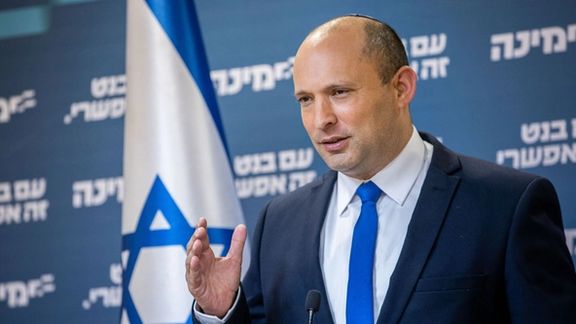
As the International Atomic Energy Agency Board of Governors convenes in Vienna, the Israeli premier has called on the watchdog to put pressure on Iran.
Addressing the Knesset’s Foreign Affairs and Defense Committee on Tuesday, Naftali Bennett said, “We expect the IAEA Board of Governors to place a clear warning light in front of the regime in Tehran, and make it clear that if it continues in its defiant nuclear policy, it will pay a heavy price.”
Bennet said Israel has "shifted gear" when it comes to Iran, describing last year as a “turning point” in Israel’s policy against the Islamic Republic.
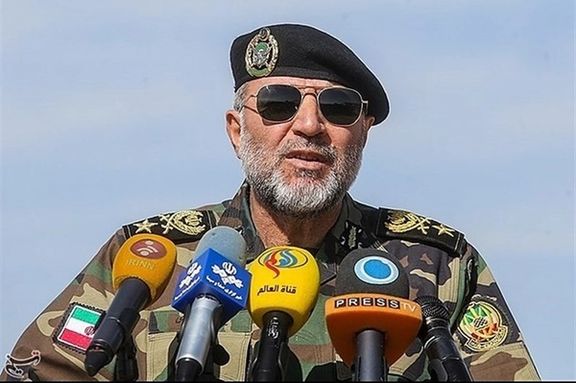
Earlier in the day, the commander of the Iranian Army’s Ground Force Brigadier General Kioumars Heydari warned that “By the order of the Supreme Leader, we will raze Tel Aviv and Haifa to the ground for any mistake made by the enemy.”
Bennett’s comments came as the board started a five-day meeting in Vienna on Monday and is expected to vote on a resolution, drafted by Britain, France, Germany, and the United States to censure Iran for the first time since June 2020, urging Tehran to “cooperate fully” with the UN agency.
Reuters news agency reported that the draft resolution says the board "expresses profound concern that the safeguards issues related to these three undeclared locations remain outstanding due to insufficient substantive cooperation by Iran…[and] calls upon Iran to act on an urgent basis to fulfil its legal obligations.”
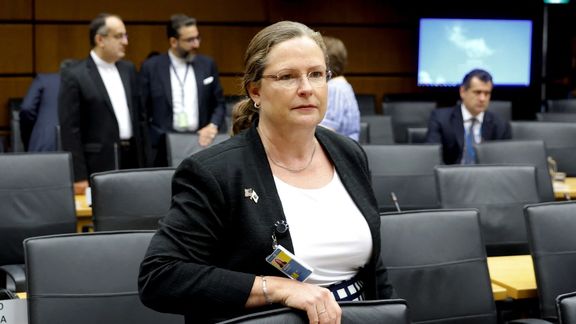
A US and European draft resolution at the UN nuclear watchdog is mildly critical of Tehran but may further sour talks on reviving the 2015 Iran nuclear deal.
A vote is expected at the 35-member board of the United Nations’ International Atomic Energy Agency (IAEA), meeting in Vienna, Wednesday evening or Thursday morning. The resolution from the United States, France, Germany, and the United Kingdom does not seek to refer Iran to the UN Security Council over its failure to satisfy the agency over uranium traces found at three sites.
Reuters news agency reported that the draft resolution said the board "expresses profound concern that the safeguards issues related to these three undeclared locations remain outstanding due to insufficient substantive cooperation by Iran…[and] calls upon Iran to act on an urgent basis to fulfil its legal obligations and, without delay, take up the (IAEA) director general’s offer of further engagement to clarify and resolve all outstanding safeguards issues."
Mikhail Ulyanov, Russia’s ambassador to the IAEA, tweeted that “for unknown reasons” the US and ‘E3’ “believe that a resolution is the best way to address outstanding safeguards issues,” which Ulyanov called “extremely doubtful.”
As a signatory of the Nuclear Non-Proliferation treaty (NPT), Iran is required to satisfy the IAEA though ‘safeguards’ that its nuclear work is peaceful. Rafael Mariano Grossi, IAEA director general, told the agency’s quarterly board meeting Monday that he was unable to certify this after what he regards as unsatisfactory answers from Iran over uranium traces found by inspectors.
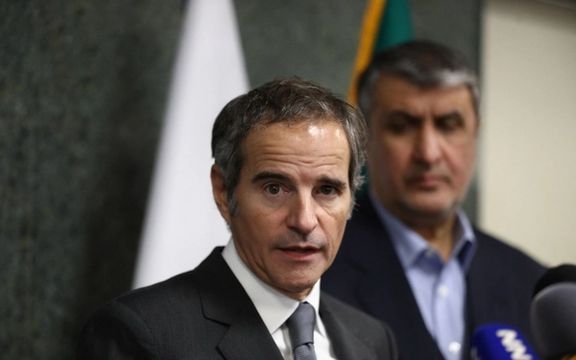
Tehran has downplayed the significance of the uranium traces, which relate to work carried out before 2003, and insisted it has given complete answers. Iran – backed by Russia and China – has argued that ‘technical’ issues of nuclear monitoring, including the ‘safeguards’ issues of pre-2003 work, should be kept distinct from the ‘political’ task of negotiating revival of the 2015 nuclear deal, the JCPOA (Joint Comprehensive Plan of Action).
Reacting to news of the resolution, Vahid Jalalzadeh, chairman of the Iranian parliament’s foreign policy committee, reportedly said the passing of the resolution would lead Iran to reconsider its role in the JCPOA talks.
This followed Iranian Foreign Minister Hossein Amir-Abdollahian tweeting Sunday: "Those who push for anti-Iran resolution at IAEA will be responsible for all the consequences.”
‘Insignificant’ uranium traces
Kazem Gharibabadi, Iran’s IAEA ambassador 2018-21, told state broadcaster IRIB Monday that the agency had established that the “insignificant” traces had come from “one of the countries with nuclear weapons.”
“The agency itself informed us that this uranium was of the type…is from one of the counties with nuclear weapons, not because it is used in nuclear weapons, but because of its origin,” he said.
The IAEA has long investigated Iran’s nuclear work before 2003, when many analysts believed it imported equipment from Pakistani nuclear scientist AQ Khan that might previously have been used to enrich uranium.
But Gharibabadi added to the mystery with a suggestion that “when Esfahan steel was commissioned before the [1979] Revolution, one of these countries was active there.”
While the pre-2003 IAEA probes were given less prominence after the JCPOA, they have re-emerged in part because of documents from 2004-5 released by Israel purporting to show Iran using purloined IAEA files to hoodwink nuclear inspectors.
With Tehran since 2021 restricting its cooperation with the agency to little more than the basic level required under safeguards, the US and the ‘E3’ have increasingly treated the matter as an important issue of transparency.

Addressing the board of the UN nuclear agency Monday, Rafael Mariano Grossi, the agency chief, reiterated criticism of Iran’s cooperation in his recent report.
France, Germany, the United Kingdom, and the United States have been discussing a possible resolution censuring Tehran at the quarterly board meeting of the International Atomic Energy Agency, while China and Russia have warned this could upset negotiations over reviving the 2015 Iran nuclear agreement.
The most contentious part of Grossi’s report referred to the discovery of uranium traces at three sites in Iran linked to nuclear work carried out before 2003.
“Iran has not provided explanations that are technically credible in relation to the Agency’s findings at three undeclared locations in Iran,” he said. “Nor has Iran informed the Agency of the current location, or locations, of the nuclear material and/or of the equipment contaminated with nuclear material, that was moved from Turquzabad in 2018.”
Grossi told the board – which meets from today until June 10 – that he could not confirm Iran’s adherence to its ‘safeguards agreement’ as a signatory of the Nuclear Non-Proliferation treaty “unless and until” Tehran provided “technically credible explanations for the presence of uranium particles of anthropogenic origin at Turquzabad, Varamin and ‘Marivan’ and informs the Agency of all current locations of the nuclear material and/or of the contaminated equipment.”
While these issues do not directly relate to talks to restore the 2015 agreement, the JCPOA (Joint Comprehensive Plan of Action), they are seen by the US and three European states as a crucial issue of Iran’s credibility.
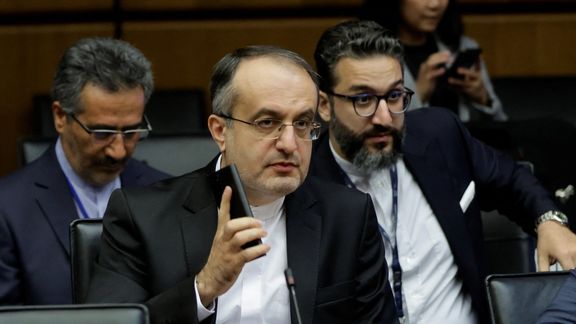
‘Technical’ issues
Iran quickly rejected Grossi’s speech to the agency board. Foreign Ministry spokesman Saeed Khatibzadeh said the IAEA chief had made a “hurried response” with his report. “We had planned a third round of discussions but he didn’t wait,” the spokesman said, adding that any resolution would “impact negatively on cooperation with the IAEA and on the nuclear talks.”
Mohammad Eslami, head of the Atomic Energy Agency of Iran, told al-Jazeera television that Iran had given “very precise answers” to the IAEA. According to an agreement reached by Grossi in early March, Tehran was required to give written replies by March 20 and satisfy the agency over any queries by June 21.
Iran, China and Russia have all argued that questions arising from Iran’s pre-2003 nuclear work are ‘technical’ and should not derail ‘political’ efforts to revive the JCPOA, from which President Donald Trump withdrew the US in 2018, imposing ‘maximum pressure’ sanctions that prompted Iran after 2019 to expand its nuclear program beyond JCPOA limits.
Majority vote
While in the past welcoming the ‘technical’ role of the IAEA, Tehran criticized last week’s trip by Grossi to Israel, which is not an NPT signatory and which is the only nuclear-armed Middle East state. Iran’s English-language outlet Press TV accused Grossi and Israeli prime minister Naftali Bennett of “collusion,” and contrasted Israel’s secret nuclear arsenal with Iran facing extensive IAEA inspections.
Any vote at the IAEA board on a resolution critical of Iran will be made by a simple majority of the 35 members, but a referral to the United Nations Security Resolution would be in different circumstances to 2005-6 when Russia and China voted for international sanctions at the UNSC.
Grossi told the board the IAEA was open to continued dialogue with Iran to resolve all issues. “As in the past, and in order for the agency to be in a position to provide assurance that Iran’s nuclear program is exclusively peaceful, the agency remains ready to re-engage without delay with Iran to resolve these matters,” he said.
Grossi told a press briefing: “These issues will not go away.”